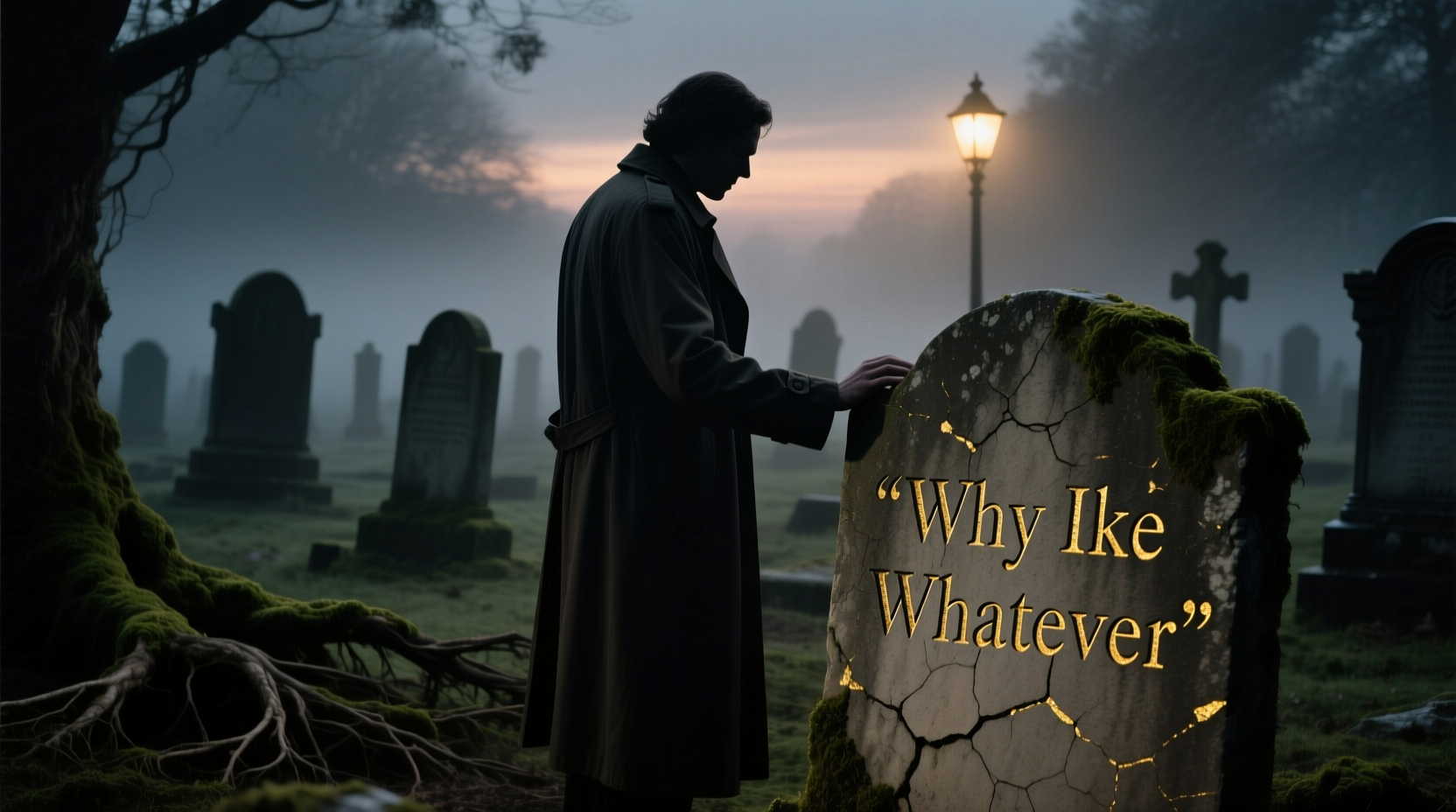The phrase “Ike whatever” followed by “do you mean exploring the tombstone quote” has gained traction online—not as a literal historical statement, but as a curious linguistic artifact born from misheard dialogue, internet humor, and deep-cut references to American pop culture. At first glance, it appears nonsensical. But beneath the surface lies a fascinating intersection of film history, misinterpretation, and digital folklore.
This inquiry doesn’t stem from an actual quote in any official record or speech by Dwight D. Eisenhower—commonly known as “Ike.” Instead, it traces back to a widely shared audio clip from the 1993 film *Tombstone*, where actor Val Kilmer, portraying Doc Holliday, delivers rapid-fire lines with a Southern drawl so thick that certain phrases become nearly unintelligible. One such moment has been misheard—or intentionally reinterpreted—as “Ike, whatever… do you mean exploring the tombstone quote?”
While no such line exists verbatim in the script, this mishearing has evolved into a meme, a philosophical prompt, and even a metaphor for how we interpret language, history, and authenticity in the digital age.
The Origin: Mishearing in *Tombstone*

In *Tombstone*, Val Kilmer’s performance as the tubercular gunslinger Doc Holliday is iconic. His delivery—sarcastic, fast-paced, and laced with a Georgia accent—is both captivating and challenging to parse. During the famous O.K. Corral buildup, Doc confronts a group of cowboys with a series of taunts, including the real line:
“Why, you must be the idiot they didn’t tell me about.”
However, due to the speed, accent, and background noise, many viewers over the years have reported hearing variations like “Ike, whatever,” “I can’t remember,” or even “Ike whatever, do you mean exploring?” These auditory illusions are classic examples of mondegreens—misheard phrases, especially in spoken or sung language.
Film linguist Dr. Lena Pruitt explains:
“When dialogue is delivered rapidly with regional inflections, the brain fills in gaps based on expectation. In *Tombstone*, Kilmer’s enunciation dances between clarity and slurred defiance—perfect conditions for misinterpretation.” — Dr. Lena Pruitt, University of Southern California, Department of Film Linguistics
The addition of “exploring the tombstone quote” likely emerged later in online forums, where users began riffing on the misheard audio, turning it into a surreal, almost existential question.
Cultural Evolution: From Mishearing to Meme
By the early 2020s, “Ike whatever, do you mean exploring the tombstone quote?” had surfaced on platforms like Reddit, Twitter (now X), and TikTok. It was rarely used literally. Instead, it became a satirical device—a way to mock overly analytical discussions about pop culture.
For example, someone might post a screenshot of a mundane movie line and caption it: “Scholars still debate the deeper meaning of ‘Ike whatever’ in *Tombstone*.”
The joke hinges on treating a non-existent, garbled phrase as if it were a profound historical utterance worthy of academic scrutiny. It’s a parody of internet discourse, where every syllable of media is dissected for hidden meaning—sometimes beyond reason.
Philosophical Angle: What Does It Mean to “Explore a Quote”?
Beyond the humor, the phrase raises legitimate questions about interpretation. Why do people seek meaning in ambiguous statements? And when does exploration become overreach?
In literary theory, this relates to hermeneutics—the study of interpretation. Even false or misheard quotes can carry symbolic weight if enough people believe in their significance. Consider how misquotations like “Beam me up, Scotty” (never said in *Star Trek*) or “Luke, I am your father” (misremembered version of “No, I am your father”) have entered cultural consciousness as truth.
So, what would it mean to “explore the tombstone quote”? Not the actual screenplay, but the idea of it—the myth?
- To explore a quote is to interrogate its origin, intent, and impact.
- It means asking whether meaning resides in the speaker’s intention or the listener’s interpretation.
- It challenges us to distinguish between factual accuracy and cultural resonance.
In this light, “Ike whatever” becomes more than a typo or mishearing—it symbolizes the gap between what is said and what is heard, a space where myth is born.
Step-by-Step Guide: How to Analyze a Viral Quote Claim
When confronted with a viral or obscure quote like “Ike whatever,” follow this method to separate fact from fiction:
- Verify the source. Identify the film, book, or speech it allegedly comes from.
- Consult the official transcript. For films, use reputable subtitle databases or studio-released scripts.
- Listen to the audio carefully. Use slow playback and noise reduction tools if needed.
- Research actor interviews or director commentary. Sometimes creators address misheard lines directly.
- Trace the meme’s origin. Use reverse search tools or archive sites like Know Your Meme to find when and how the misquote spread.
- Evaluate cultural context. Ask why this misquote gained traction—was it humorous, ironic, or emotionally resonant?
This process applies not just to *Tombstone*, but to any piece of media that circulates online without clear attribution.
Real Example: The “Hold My Beer” Misquote
A parallel case occurred with the supposed quote from *The Dark Knight*: “You either die a hero, or live long enough to see yourself become the villain.” Fans often misattribute the next line as “Then Harvey Dent says, ‘Hold my beer,’ and walks into the interrogation room.”
No such line exists. Yet the joke persists because it captures the absurd escalation of the scene. Like “Ike whatever,” it reflects audience desire to narrativize and simplify complex moments.
This illustrates how misquotes function: not as errors, but as cultural shorthand. They fill emotional or comedic gaps left by the original text.
Do’s and Don’ts of Quote Interpretation
| Do | Don’t |
|---|---|
| Cross-reference multiple reliable sources before accepting a quote as accurate. | Assume a widely shared quote is true just because it’s popular. |
| Consider accent, pacing, and audio quality when interpreting spoken lines. | Dismiss mishearings as meaningless—they often reveal cultural priorities. |
| Use misquotes as entry points for deeper media literacy discussions. | Present parody or satire as factual analysis without clarification. |
| Attribute creative reinterpretations to their online communities. | Mock others for mishearing—everyone experiences auditory illusions. |
FAQ
Did Eisenhower ever say “Ike whatever” in a speech?
No. Dwight D. Eisenhower, nicknamed “Ike,” never used the phrase “Ike whatever” in any recorded speech or writing. The confusion arises entirely from the *Tombstone* mishearing and subsequent internet memes.
Is there a real quote about exploring tombs in the movie *Tombstone*?
No. Despite the title, *Tombstone* is about the Gunfight at the O.K. Corral and does not involve archaeology or tomb exploration. The word “tombstone” refers to the town in Arizona, not literal graves or expeditions.
Why do people keep referencing this quote if it doesn’t exist?
Because it exemplifies how digital culture creates meaning through irony, repetition, and collective imagination. The phrase has become a meta-commentary on how we consume and reinterpret media.
Final Thoughts: Embracing the Ambiguity
The journey of “Ike whatever, do you mean exploring the tombstone quote?” from garbled audio to internet legend reveals something profound: our hunger for meaning, even in the meaningless. We don’t just consume stories—we reshape them, layering new interpretations atop old ones until the boundary between fact and fiction blurs.
This isn’t necessarily a flaw. It’s a testament to the power of narrative. Whether analyzing a Western film, a presidential speech, or a viral tweet, the act of questioning—of exploring—is inherently human.









 浙公网安备
33010002000092号
浙公网安备
33010002000092号 浙B2-20120091-4
浙B2-20120091-4
Comments
No comments yet. Why don't you start the discussion?